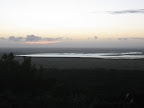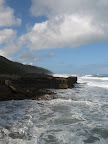
The phone only rings twice before someone answers.
“Lidiko Lodge, can I help you?” answers a heavily Afrikaans-accented lady’s voice.
“Hi, yes,” I say. “I’m phoning from
“Yes, yes we do. When do you want to come?”
“Now. 2 nights”
“Now? Yes, we can do that. What’s the name?” I give my details and hang up. It is 3pm on Friday. I am standing in a hectic outpatients department and feel an overwhelming need for restaurants and hot water. The resort town of
I jump in the car at 6pm and head out of the hospital nearly hitting a Department of Health 4WD on my way out. “Hey doctor,” says the guard, “you nearly hit him.” I smile ruefully. I am drifting off as I enter stretch of road that runs through the game park and have to employ my patented stay-awake-whilst-driving technique (which involves abrupt tugs on one’s groin hair through one’s pocket). Ten minutes into the park I pass three rhino grazing by the side of the road. Suddenly the patented technique is redundant.
I pass through the now familiar settlements that line the side of the road, then the town of Mtubatuba (one shop sign reads “Tombstone World”) in which hordes of people are pouring out of Spar and into KFC, Wimpy and Nando’s, and finally hit the stretch of forested road that leads to the coast and St Lucia. It is as if I have passed through some improbable “portal” – only 20 minutes from mud huts, African markets and road goats, St Lucia could have dropped out of Florida: the carefully kept lawns, roads and shops; the 4WD vehicles all towing power boats; the streets and restaurants all full of wealthy looking white people. I am embarrassed at how delighted at it all I am.
I spot the lodge and park the car, walking up the steep path through the garden to the porch. I am instantly spotted by the Afrikaans lady I spoke to. “You must be the doctor from Hlabisa. Come let me show you to your room, and then you must come and join us – we are having a braai. We don’t normally do dinner.” The lodge is great – 10 rooms in a square all opening onto the pool. I dump my stuff and head back to the stoep with my book. She calls me over, “Now you have a choice – you can either sit all by yourself over there with your book or you can come join us – this is my husband and this is Rob – he works for the Wetlands park.” Food and beer are gently forced upon me and I join them. They are very interested in what the hospital is like at the moment – they have had several doctors visit from there before. They keep calling me Ned. The moment for correcting has passed. I am too embarrassed to say anything now. They tell me all about their local GP who is an entrepreneur – “He is a one stop shop – you can go fishing with his boat hire company, have dinner in his restaurant, get drunk and beaten up at his bar, and then call him to stitch you up.”
Before bed I have a swim in the pool – it is pitch black above me, Orion and the Southern Cross clearly visible.
In the morning, as I head out, the husband stops me and introduces me to a couple. “This is Ned, he works at

I get up and walk aimlessly down the beach a little. As I round the headland a new expanse of sand opens up before me. Crawling from the sea onto it are thousands on tiny crabs. The waves sweep them up from time to time, pulling them back to the ocean. A few are beyond the waves and seem to be eyeing me. I walk along the beach. As I approach they change direction, scuttling back into the see one after the other in a Crustaceal-Mexican wave. I stop. Their bulbous stalked eyes examining me as they slowly crawl up the beach again.
The following morning I check out of the lodge ready to head to another stretch of beach with my body board. My hosts shake my hands warmly. “You must come again Ned.” I say that yes of course I will, knowing that of course I will not. I cannot. Not now they firmly and irrevocably think my name is Ned.


Comments
Who would have thought that Bill Bryson could squeeze himself into that thin little body of yours? I can definitely hear a little voice screaming 'let me out, I'm a travel writer'...
Lovin' your work. Austin